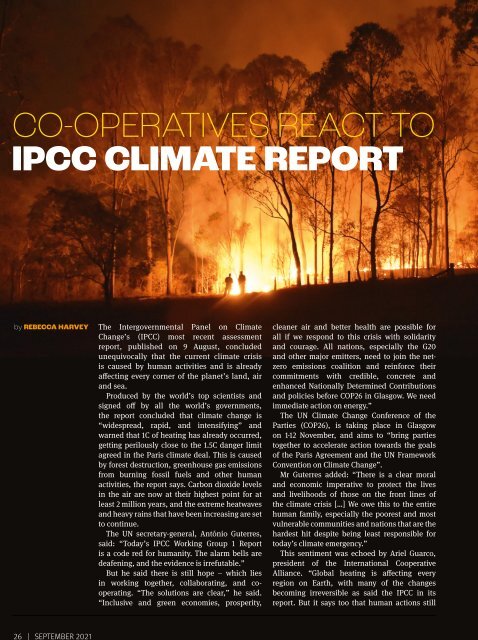Co-op News September 2021
The September edition of Co-op News: connecting, challenging and championing the global co-operative movement. This issue we look at Principle 6 - co-operation among co-ops: including a look at how co-ops are coming together to find solutions to the environmental challenges facing the world - whether that means stepping up the war on plastic waste in the UK or helping the clean energy transition in Croatia. We look at efforts to provide co-op housing and community pubs, and speak to Lord Victor Adebowale – Co-op Group director and chair of Social Enterprise UK - about co-operation with other socially led sectors. And there's a look at the co-op environment that helped nurture US Olympian Dalilah Muhammad.
The September edition of Co-op News: connecting, challenging and championing the global co-operative movement. This issue we look at Principle 6 - co-operation among co-ops: including a look at how co-ops are coming together to find solutions to the environmental challenges facing the world - whether that means stepping up the war on plastic waste in the UK or helping the clean energy transition in Croatia. We look at efforts to provide co-op housing and community pubs, and speak to Lord Victor Adebowale – Co-op Group director and chair of Social Enterprise UK - about co-operation with other socially led sectors. And there's a look at the co-op environment that helped nurture US Olympian Dalilah Muhammad.
Create successful ePaper yourself
Turn your PDF publications into a flip-book with our unique Google optimized e-Paper software.
26 | SEPTEMBER <strong>2021</strong><br />
CO-OPERATIVES REACT TO<br />
IPCC CLIMATE REPORT<br />
by REBECCA HARVEY<br />
The Intergovernmental Panel on Climate<br />
Change’s (IPCC) most recent assessment<br />
report, published on 9 August, concluded<br />
unequivocally that the current climate crisis<br />
is caused by human activities and is already<br />
affecting every corner of the planet’s land, air<br />
and sea.<br />
Produced by the world’s t<strong>op</strong> scientists and<br />
signed off by all the world’s governments,<br />
the report concluded that climate change is<br />
“widespread, rapid, and intensifying” and<br />
warned that 1C of heating has already occurred,<br />
getting perilously close to the 1.5C danger limit<br />
agreed in the Paris climate deal. This is caused<br />
by forest destruction, greenhouse gas emissions<br />
from burning fossil fuels and other human<br />
activities, the report says. Carbon dioxide levels<br />
in the air are now at their highest point for at<br />
least 2 million years, and the extreme heatwaves<br />
and heavy rains that have been increasing are set<br />
to continue.<br />
The UN secretary-general, António Guterres,<br />
said: “Today’s IPCC Working Group 1 Report<br />
is a code red for humanity. The alarm bells are<br />
deafening, and the evidence is irrefutable.”<br />
But he said there is still h<strong>op</strong>e – which lies<br />
in working together, collaborating, and co<strong>op</strong>erating.<br />
“The solutions are clear,” he said.<br />
“Inclusive and green economies, prosperity,<br />
cleaner air and better health are possible for<br />
all if we respond to this crisis with solidarity<br />
and courage. All nations, especially the G20<br />
and other major emitters, need to join the netzero<br />
emissions coalition and reinforce their<br />
commitments with credible, concrete and<br />
enhanced Nationally Determined <strong>Co</strong>ntributions<br />
and policies before COP26 in Glasgow. We need<br />
immediate action on energy.”<br />
The UN Climate Change <strong>Co</strong>nference of the<br />
Parties (COP26), is taking place in Glasgow<br />
on 1-12 November, and aims to “bring parties<br />
together to accelerate action towards the goals<br />
of the Paris Agreement and the UN Framework<br />
<strong>Co</strong>nvention on Climate Change”.<br />
Mr Guterres added: “There is a clear moral<br />
and economic imperative to protect the lives<br />
and livelihoods of those on the front lines of<br />
the climate crisis […] We owe this to the entire<br />
human family, especially the poorest and most<br />
vulnerable communities and nations that are the<br />
hardest hit despite being least responsible for<br />
today’s climate emergency.”<br />
This sentiment was echoed by Ariel Guarco,<br />
president of the International <strong>Co</strong><strong>op</strong>erative<br />
Alliance. “Global heating is affecting every<br />
region on Earth, with many of the changes<br />
becoming irreversible as said the IPCC in its<br />
report. But it says too that human actions still


















